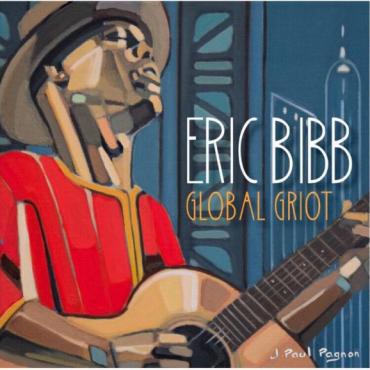
Eric Bibb has finally claimed his unofficial title. For decades, fans and critics have known him as a Global Griot, a soulful troubadour projecting Sam Cooke’s mellow vocals on a worldwide web blend of folk, blues, and soul. Son of acclaimed folksinger and civil rights activist Leon Bibb, Eric Bibb’s uncle was John Lewis of the Modern Jazz Quartet. Eric grew up in a comfortable environment in NYC’s East Village with guests including Bob Dylan and Peter, Paul, and Mary dropping by the house parties when he was a child. When Eric Bibb decided to try on some blues, he decided early on he would be honest in his presentation of it and not pretend he came up hard.
“I realized that it was just not gonna fly for me to pose and pretend that I’d had a razor totin’ upbringing, cause I didn’t,” he told me in an interview in 2005. “So you make a decision, I‘m gonna be myself, and some people are gonna criticize me for being too gentle, but that’s really their issue, not mine.”
His latest, Global Griot, recorded in several studios in Sweden, France, England, Jamaica, Canada, Ghana, and the US, boasts an international cast of griots including longtime collaborator Habib Koite as well as kora master Solo Cissokho. The two-CD, 24-song track list also features Bibb’s wife, Ulrika, on vocals; frequent musical accompanist Harrison Kennedy; rocksteady, ska/reggae vocalist Ken Boothe (“Why Baby Why,” “Crying Over You”); as well as Linda Tillery, who Bibb met while working on 1997’s Shakin’ a Tail Feather, a children’s record of classic R&B with Taj Mahal.
Bibb’s delivery is mellow, but quite often his subject matter is not. He has never shied away from controversy, covering classic protest songs as well as his own vitriolic takes on politics and global affairs. On “We Don’t Care,” he takes on all of us who want our creature comforts without thinking about who suffered to provide us with them: “We want the gold / Long as we don’t have to mine it / Don’t care who suffers / Or who’s behind it. / We want the cool running shoes / Don’t care who made ’em / Don’t care if they go to school / Or what the company paid ’em.”
Bibb takes on the president directly on “What’s He Gonna Say Today,” banjo clucking softly in the background as he marvels at the new horrors spewing daily from the commander in chief’s lips: “Got a president addressing the nation, sounding like Family Guy / Crazy ain’t nothin’ new but we’re talking pure madness here, a nightmare comin’ true / Don’t it make you wanna holler, don’t it make you wanna pray / Don’t it make you wonder, what’s he gonna say today?”
“Human River” takes another swipe at our feckless leader: “Hitler tried to conquer the world / Now there’s a clown sitting up on his golden throne / Saying things that make you wanna hurl.” But Bibb has a solution, spreading a love message through the mighty human river of griots like himself, his message lubricated by frequent tour accompanist Staffan Astner’s mournful slide guitar.
Harrison Kennedy shares vocal duties with Bibb on “Black, Brown, and White,” taking on racial discrimination on his cover of Big Bill Broonzy’s 1952 protest song about black war veterans’ inability to get jobs if their skin was the wrong hue: “If you’re black and gotta work for a living, this is what they will say to you: If you white, should be all right / If you brown, stick around / But if you’s black, m-mm brother, git back.”
Harrison guests again with some rousing gospel fervor on the soulful “Listen For the Spirit,” about letting music guide you to your spiritual home.
Sounding like it’s about to break out into Bobby McFerrin’s ’88 hit “Don’t Worry be Happy,” Bibb’s “Let God” is a upbeat interpretation of the spiritual exhortation to “let go and let God” take care of your business.
Bibb’s African roots are always just below the surface, exposed with the help of Drissa Dembele’s chiming, xylophone-like balafon, a perfect counterpoint to Bibb’s intricate 12 string fingerpicking on “A Room For You.”
“Remember Family” is a shout-out to his global musical family of collaborators including Koite (2012’s Brothers in Bamako) and Cissokho, in locations from Nairobi to Capetown, from Lagos to Bamako.
Ed McCurdy’s 1950 anti-war song “Last Night I Had The Strangest Dream” was covered in 1956 by Pete Seeger, in 1964 by Arlo Guthrie, in 1978 by Simon and Garfunkel, in 1982 by Joan Baez, and in 2002 by Johnny Cash. But Bibb’s cover is the lushest and smoothest, gliding along to the harp-like emanations of his 12-string resonator guitar.
Linda Tillery’s glorious gospel vocal dominates “New Friends,” but Bibb’s mellifluous counter-crooning anchors it as the duo offer up a prayer for global peace and recognition for everyone as a child of God, respected equally.
“Mole In The Ground” is a traditonal song from 1928, recorded by Doc Watson in 1975. Bibb starts it off folkily, but when Boothe comes in, switching it to easy-rolling ska, the two harmonize like family, with Boothe adding delicious soulful licks to Bibb’s smooth crooning. It’s easily the most infectious, uplifting cut in the collection.
“Needed Time” is usually attributed to Lightnin’ Hopkins’ 1950 rendition. It was covered by Taj Mahal on 1973’s Sounder,and has been a staple of Bibb’s live shows for years, but it wasn’t recorded till 2014’s Blues People. With Cissokho’s celestial kora flourishes and wife Ulrika’s churchy vocals, this version is the perfect benediction, a fitting closer to one of the best services of Bibb’s career.




